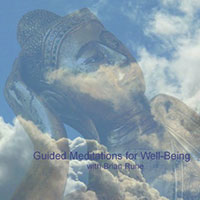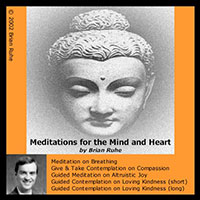Books
 A Short Walk On An Ancient Path —
A Short Walk On An Ancient Path —
A Buddhist Exploration of Meditation, Karma and Rebirth
Praise for A Short Walk On An Ancient Path: This easy-to-read book takes you on a journey into the Buddha’s world view; you will learn practical mindfulness methods of breath meditation, loving kindness and walking meditation to enhance health, well-being and insight. The subtitle describes its major themes: A Buddhist Exploration of Meditation, Karma and Rebirth.
Reviews
[quote]…Brian Ruhe has written an excellent introduction to Theravada Buddhism; its central teachings are found in the book, and there are extremely useful meditation guides as well. And it is all presented in a clear and precise manner, which makes it all immensely accessible to both longterm Buddhists and newbies. I sincerely believe that this book can assist its reader to develop the insight and skills necessary to enlightenment, and, as he has an excellent website as well, Brian Ruhe is available for further advice on the ancient path of the Buddha.[/quote] – Gary Daubney, Buddha Space website.
[quote]When even the CIA can’t decipher many Buddhist books on meditation, this clear yet profound handbook of teachings stands out from the rest. Moreover, it introduces the Dharma teachings of great North American Forest Monks to the general readership for the first time. If you are serious about Nirvana, get this book![/quote] – Ajahn Brahm, author of Who Ordered This Truckload of Dung?
[quote]Brian Ruhe is a long-time Vancouver teacher of authentic Buddhism, not the sugar-coated sentimental kind often marketed in North America. He is clear and engaging, not to mention a nice guy.[/quote] – Douglas Todd, Spirituality and Philosophy, Vancouver Sun
Sample Chapters
 Freeing The Buddha
Freeing The Buddha
This book has a fresh approach to Buddhism which stirs up dust in areas that most people have not thought of. There are Buddhist teachers who a would discuss things privately such as Buddhist views on UFOs, Adolf Hitler and the historical Jesus, but they would not give public talks or publish books on such controversial subjects. The author has the courage to do so as he boldly discusses such topics in this book.
Review
[quote]I think Ruhe is on to something! In all honesty, I initially bought Freeing the Buddha with only a mild interest in what he had to say. However, after skimming through some of it, I am very impressed, particularly with the essays section. Ruhe’s writing is very original, creative and seminal. I support him in making his work more accessible to more influential people in the publishing industry. Nowadays, it seems that inflammatory writing is not only hip, but needed, given the dangerously sleepy state of affairs on our planet.[/quote] – Teertha Mistlberger, Founder and Director of Shamballa Society (West Vancouver, B.C.)
From the Author
Writing this book was a labour of love. My intention was not to reinvent the wheel and write just another introduction to Buddhism. I didn’t write this to be just a ‘feel good’ book. I wrote this because I wanted to help the reader find the truth. I am a truth seeker and this book was written for truth seekers who want to know what Buddhism is and what it is not. Freeing the Buddha is both inspiring and sobering, showing the best and the worst in Buddhism so that you will be an informed Buddhist. – Brian Ruhe
Gary Daubney full book review from Buddha Space website:
February 21, 2012
Good books on the Dharma are not that easy to come by, unfortunately. Sure, there are a plethora of publications and websites that are about Theravada Buddhism, for example, but most are riddled with platitudes or misconceptions, even about basic Buddhist ideas like karma and rebirth (see below). Ruhe’s book A Short Walk on an Ancient Path is a refreshing antidote to much of these somewhat poisonous misrepresentations of the Buddha’s teaching. And, as it states in its subtitle, it is A Buddhist Exploration of Meditation, Karma and Rebirth, some of the essential doctrines of Buddhism.
Ruhe is a Theravada Buddhist, having spent some time in the mid-Nineties as a bhikkhu (ordained monk) in Thailand, and now teaching Buddhism and meditation. He is based in Vancouver, Canada, and teaches groups and individuals covering topics such as Mindfulness for Well-Being, and Meditation to Reduce Physical Pain. He has also written two books, the first of which was Freeing the Buddha, and the second being the subject of this review.
The book is a little over two hundred pages, and is crammed with black and white photographs from the world of Theravada Buddhism, primarily Thailand. For a relatively short book, A Short Walk’ covers the essential teachings and meditation practices extremely well. It is organized into nine chapters which cover The Four Noble Truths, Karma and Rebirth, and, most interestingly, Buddhist Cosmology. These are more on the theoretical, doctrinal level of Dharma, but the author also manages to include practical meditation instruction too, in the chapters How to Meditate, Opening the Heart, and The Five Hindrances.
So, Ruhe starts at the beginning of all Buddhist teachings with The Four Noble Truths. He is clearly comfortable at explaining these concepts and introduces them in easy-to-understand language, without ever dumbing down to the point of inanity. He contrasts the Buddha’s teachings with Christian ones, a device which he explains allows a western readership to more easily grasp Buddhist ideas. Here a sample of the author’s technique in this area:
“In the Bible, the emphasis is on a later time, at death. At death you will be rewarded for your patience go to church on Sundays, and you will get to go to heaven if you’ve been good. Buddhists are taught to be like the Buddha, to imitate the Buddha, and eventually become an arahant, as the Buddha was. Christians are not taught to be Jesus Christ, and they are not taught to realize their own godhood.”
(A Short Walk on an Ancient Path, p.4)
In the chapter Karma and Rebirth, Ruhe introduces us to his own meditation teacher Ajahn Sona, a western monk form the Thai forest tradition who is abbot of Birken Forest Monastery in Canada. A long and stimulating essay on the subject written by the ajahn opens this part of the book. In contrast to many modern-minded (perhaps postmodern-minded!) Buddhists, both the ajahn and Ruhe believe in karma and rebirth as traditionally taught in Buddhism. Alongside them, the well known monk Bhikkhu Bodhi also contributes to this chapter, which also contains references to many case studies regarding rebirth.
Now, whilst basically neither believing in the entirety of these subjects as traditionally taught, this reviewer tends to veer towards a somewhat modernist, psychological interpretation. Nevertheless, Ajahn Sona, Bhikkhu Bodhi and Ruhe himself present their thoughts in an engaging and persuasive manner, enabling even the most skeptical of readers to open up to at least the possibility that we are reborn according to our actions as Buddhism has long insisted. The author writes the following.
“Karma and rebirth is not just a religious belief. From a Buddhist view there is evidence all over the place. Look at your tendencies, your talents and abilities and your phobias. Some of this may have been carried over from a previous life. Even though the vast majority of people don’t remember their previous lives, past life memories are implicit, not explicit.”
(Ibid. p.96)
Another challenging chapter mentioned earlier is called Buddhist Cosmology, and contains much that many of those (post-)modernists would frown upon. Ruhe’s view is that the heavenly and hellish realms, deities, ghosts, hell-dwellers, and the like that appear throughout the Tipitika – the Theravada Buddhist scripts, also known as the Pali Canon – are literally true. The reason people do not see them is “the lower concentration of our minds” that most of us possess. Deep states of concentration are an important skill developed in Buddhist meditation, which the Buddha is said to have perfected, hence the scriptures contain many instances where he converses with deities.
Talking of meditation, it is important to note that unlike many introductory books on Buddhist teachings, A Short Walk’ also contains several meditation instructions. The main meditation methods used in Theravada Buddhism are all here: meditation on breathing (two methods as taught by Ajahn Sona and Thanissaro Bhikkhu), meditation on loving-kindness (as taught by Ajahn Sona), and walking meditation (as taught by Ajahn Kusalo). The author also includes his own extensive commentaries on these methods, as well as useful tips on how to utilize them in our everyday lives.
“When walking down the street you shouldn’t use the usual walking meditation technique. You are moving faster and you need to be on the lookout fir cars and people but you can still practice mindfulness. Usually our minds are all over the place when we’re walking around in the city and we don’t pay much attention to sensations in the body…We walk so often, even close to home so this is a true opportunity to practice dhamma.”
(Ibid. p.47)
In the final chapter of the book, Ruhe explores another important aspect of Buddhist practice not often examined that closely in books on Buddhism: the five hindrances. As he writes, “The five hindrances are the cause of delusion.” (Ibid. p.177) The author states that it is through mindfulness that delusion can be seen and understood, and that this is the path to nirvana. He goes into a lot of detail on each of the five hindrances, but unfortunately there’s not the time or space to examine them here, but this reviewer recommends that you purchase the book to study this subject more closely…it would be well worth your while!
So, overall, Brian Ruhe has written an excellent introduction to Theravada Buddhism; its central teachings are found in the book, and there are extremely useful meditation guides as well. And it is all presented in a clear and precise manner, which makes it all immensely accessible to both longterm Buddhists and newbies. I sincerely believe that this book can assist its reader to develop the insight and skills necessary to enlightenment, and, as he has an excellent website as well, Brian Ruhe is available for further advice on the ancient path of the Buddha. (See the links below.) If this recommendation isn’t enough for you, however, let’s finish by looking at what that famous and highly-regarded Buddhist monk Ajahn Brahm has to say about it:
“When even the CIA can’t decipher many Buddhist books on meditation, this clear yet profound handbook of teachings stands out from the rest. Moreover, it introduces the Dharma teachings of great North American Forest Monks to the general readership for the first time. If you are serious about Nirvana, get this book!”
Meditation CDs
 Guided Meditations for Well-Being
Guided Meditations for Well-Being
Includes two different guided breath meditations by Brian Ruhe:
26 minutes breathing into the body
22 minutes breath meditation at the nose
Order/Buy: $15 each + $6 postage.
 Meditations for the Mind and Heart includes:
Meditations for the Mind and Heart includes:
Meditation on Breathing
Give & Take Contemplation on Compassion
Guided Meditation on Altruistic Joy
Guided Contemplation on Loving Kindness (10 minutes)
Guided Contemplation on Loving Kindness (20 minutes)
Order/Buy: $15 each + $6 postage.



